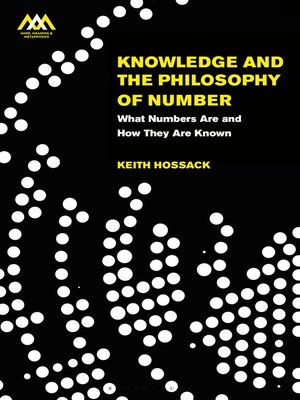Knowledge and the Philosophy of Number
ebook ∣ What Numbers Are and How They Are Known · Mind, Meaning and Metaphysics
By Keith Hossack

Sign up to save your library
With an OverDrive account, you can save your favorite libraries for at-a-glance information about availability. Find out more about OverDrive accounts.
Find this title in Libby, the library reading app by OverDrive.



Search for a digital library with this title
Title found at these libraries:
| Library Name | Distance |
|---|---|
| Loading... |
If numbers were objects, how could there be human knowledge of number? Numbers are not physical objects: must we conclude that we have a mysterious power of perceiving the abstract realm? Or should we instead conclude that numbers are fictions?
This book argues that numbers are not objects: they are magnitude properties. Properties are not fictions and we certainly have scientific knowledge of them. Much is already known about magnitude properties such as inertial mass and electric charge, and much continues to be discovered. The book says the same is true of numbers.
In the theory of magnitudes, the categorial distinction between quantity and individual is of central importance, for magnitudes are properties of quantities, not properties of individuals. Quantity entails divisibility, so the logic of quantity needs mereology, the a priori logic of part and whole. The three species of quantity are pluralities, continua and series, and the book presents three variants of mereology, one for each species of quantity.
Given Euclid's axioms of equality, it is possible without the use of set theory to deduce the axioms of the natural, real and ordinal numbers from the respective mereologies of pluralities, continua and series. Knowledge and the Philosophy of Number carries out these deductions, arriving at a metaphysics of number that makes room for our a priori knowledge of mathematical reality.
This book argues that numbers are not objects: they are magnitude properties. Properties are not fictions and we certainly have scientific knowledge of them. Much is already known about magnitude properties such as inertial mass and electric charge, and much continues to be discovered. The book says the same is true of numbers.
In the theory of magnitudes, the categorial distinction between quantity and individual is of central importance, for magnitudes are properties of quantities, not properties of individuals. Quantity entails divisibility, so the logic of quantity needs mereology, the a priori logic of part and whole. The three species of quantity are pluralities, continua and series, and the book presents three variants of mereology, one for each species of quantity.
Given Euclid's axioms of equality, it is possible without the use of set theory to deduce the axioms of the natural, real and ordinal numbers from the respective mereologies of pluralities, continua and series. Knowledge and the Philosophy of Number carries out these deductions, arriving at a metaphysics of number that makes room for our a priori knowledge of mathematical reality.






